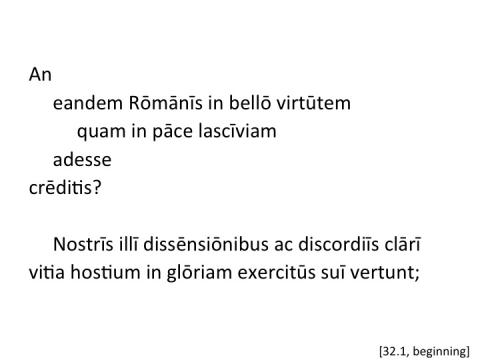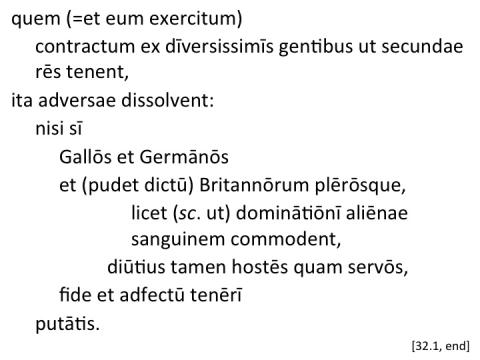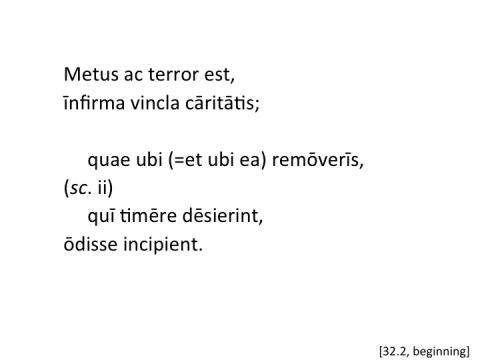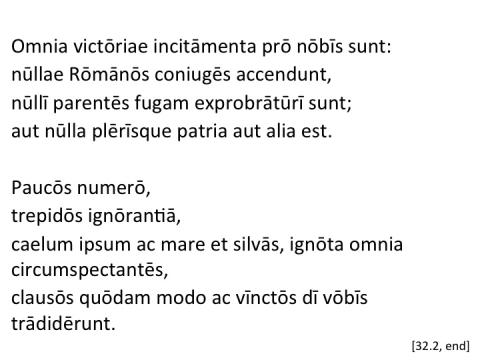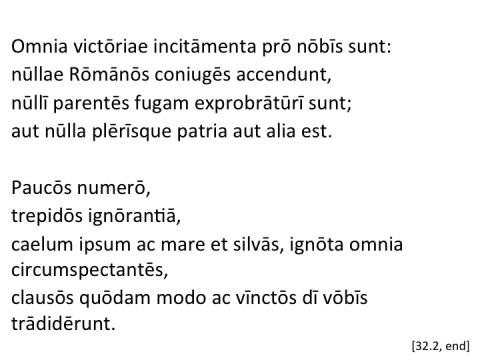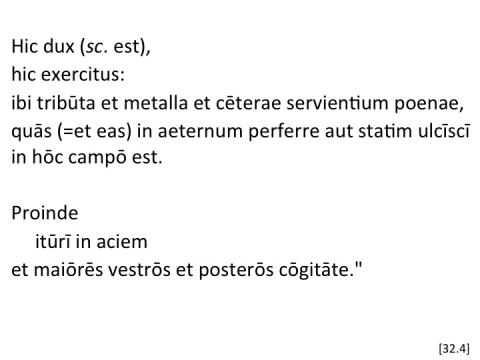Overview: “The previous successes of the Romans have been due to our dissensions. Their army will disintegrate at the first blow. Everything favors our victory; afterwards we have nothing to fear. It is yours to choose between vengeance and death.” (Stuart); this chapter begins on f. 61r of the codex Aesinas.
32.1
dissēnsiōnibus: Tacitus utilizes rhetorically the criticism expressed in chapter 12.5-6. (Stuart) dissēnsiōnibus ac discordiīs: can be construed as a hendiadys. Tr. “quarrelsome discord” or “discordant conflict.” (Fox)
quem contractum ... ut = et ut eum (sc. exercitum) contractum. The conjunction ut is long postponed. (Damon)
tenent = continent. (Pearce); “hold together.” (Sadarananda)
nisi sī (ironical) = nisi forte. Notice that the mood in such uses is the indicative. (Pearce) [A&G 437]
Germānōs: e.g. the Batavi and Tungri mentioned in ch. 36.1. (Gudeman)
pudet dictū: a unique combination of the two constructions pudendum dictu and pudet dicere. This phenomenon of two possible constructions occurring to the mind at once and resulting in a combination (“contamination”) of the two is the explanation of very many syntactical irregularities in language. (Pearce)
plērōsque: as so often in Tacitus means “very many.” (Pearce)
licet: concessive “although.” (Stuart) [A&G 527]
commodent: “put at the service of.” (Stuart) sanguinem commodent: “shed their blood.” (Gudeman); i.e., they risk their lives for or fight for. (Sadarananda)
diūtius tamen, &c.: "having however been longer." (Pearce); sarcastically, substituting amicos with servos. (Gudeman)
fide et adfectū: “loyalty and attachment.” (Gudeman); may also be an example of hendiadys in which one noun is subordinated as an adjective for another. Tr. “affectionate loyalty” or “loyal affection.” (Sadarananda)
32.2
terror: probably not fear of the Romans, but fear inspired in the Romans. (Pearce) metus ac terror: “dread and awe.” The terms are synonymous, for not only is “terror,” with but few exceptions, never used in the singular in the sense of ‘inspiring’ fear, but this meaning is excluded by the context, as timere, below, shows. They are combined to balance and contrast fide et adfectu, which also accounts for their position as predicate nominatives. (Gudeman); another example of hendiadys. Tr. “fearful terror” or “dreadful fear.” (Sadarananda)
īnfirma: a sarcastic understatement; metus ac terror do not cement affection at all. (Stuart)
remōverīs: perfect (or more properly future perfect) subjunctive of the “indefinite second person.” (Pearce) [A&G 447.2]
quī timēre dēsierint ōdisse incipient: a variation from a common proverb of the Romans: quem metuunt, odere. (Stuart)
prō nōbīs: “on our side.” (Gudeman)
Rōmānōs: notice the emphatic position. (Gudeman)
nūlla … patria aut alia: i.e. many are mere adventurers with no fixed habitation, or they are foreigners (see ch. 32.1). (Gudeman) alia: true of the cohorts of auxiliaries, such as the Batavi and the Tungri. The soldiers of the legions were actually recruited at this time from all corners of the Roman world. (Stuart); i.e. other than Rome, “alien.” (Pearce)
paucōs … circumspectantēs: as a rule, when the last member in an enumeration is amplified, it is either joined by et to a preceding asyndeton, or else the asyndeton is retained throughout, but rounded off by chiasmus. (Gudeman)
vīnctōs: i.e. panic-stricken, because hampered by insurmountable obstacles. A similar statement is made about themselves in Agricola's speech, in ch. 34.1-2. (Gudeman)
32.3
vānus aspectus: “the empty show.” (Stuart)
aurī fulgor atque argentī: added to define aspectus more closely. See note on Introd. p. xxx, #17. (Gudeman)
quod: the antecedent is the combined idea of externality. (Stuart); = quae res, for the antecedent cannot be adspectus et fulgor, which would require qui, nor aurum atque argentum, which would call for quae. (Gudeman)
nostrās manūs: the sympathizers who will become "coadjutors." (Stuart) nostrās manūs: “hosts that will take our part”; explained by what follows. (Pearce)
adgnōscent … recordābuntur … dēserent: note the emphatic position of the predicates, on which see note on Introd. p. xxvi, #3. (Gudeman)
tam … quam = ut, “in the same way as.” (Sadarananda)
dēserent ... relīquērunt: with the repetition of the verb, see note on ch. 37.6, caesa … cecidere. (Gudeman)
illōs: sc. Romanos. (Gudeman)
cēterī: a kind of prolepsis, very common in Tacitus. (Gudeman)
ultrā: i.e. beyond the Roman army, when once defeated. (Gudeman)
formīdinis: “cause of fear.” See ch. 36.3; 41.3. (Gudeman)
vacua: because their garrisons would be required to serve with the main army. (Pearce) vacua castella: “abandoned forts.” Probably rhetorical plurals, like coloniae below, the statement being an intentional exaggeration. (Gudeman)
colōniae: probably as before, chapter 5.2, a rhetorical generality, since it cannot be shown that any other colony than Camulodunum was in existence at this time. Lindum (Lincoln) may have been founded in the Flavian period. (Stuart)
inter, etc.: “what with reluctant obedience on the one hand, and unjust authority on the other, the towns are,” etc. See note on ch. 31.1. (Gudeman)
parentēs … imperantēs = obsequium … imperium. On this usage see note ch. 4.2. (Gudeman)
aegra: “disordered”; in this metaphorical sense frequently applied to the “body politic.” (Stuart); “ill at ease.” An exceedingly common metaphor, both in Greek and Latin. The two adjectives are used predicatively, on which usage see Introd. p. xxv. (Gudeman)
mūnicipia: we only know of one, Verulamium. It is probably used vaguely in the plural like coloniae. (Pearce)
32.4
hic dux, hic exercitus, &c.: on this side you have all that appeals to a martial instinct; on the other side you have all the horrors of slavery. (Pearce) hic dux: viz. Calgacus himself. (Gudeman)
metalla: they would be transported to work the mines in England or elsewhere. (Stuart); this contradicts ch. 31.2, unless we suppose that foreign or British mines are here meant to be distinguished from Caledonian. (Gudeman)
et cēterae: this phrase, usually after a polysyndetic enumeration, is characteristic of Tacitean style. (Gudeman)
ulcīscī: Calgacus speaks as though his hearers had already suffered. (Pearce)
in hōc campō: i.e. depends upon the battle to be fought on this field. The statement is common in speeches of this nature. (Gudeman)
est = positum est, “depends on.” (Pearce)
proinde: marking the climax of the appeal as is often the case in speeches. (Stuart)
maiōrēs ... cōgitāte: more emphatic than the more usual construction with de. (Gudeman)

